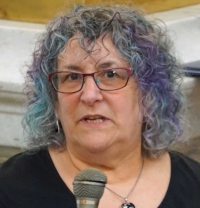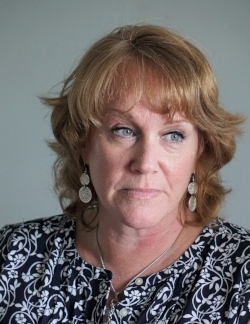RI Senate Finance, BHDDH To Seek More Funding To Protect Services And Rights Of Adults with DD
/By Gina Macris
Governor Gina Raimondo’s proposed $18.4 million cut to developmental disability services for the next fiscal year would not allow Rhode Island to continue its compliance efforts in connection with a 2014 federal consent decree, Rebecca Boss acknowledged for the first time during a budget hearing before the Senate Finance Committee on May 3.
Boss - RI CApitol tv
Boss is the highest ranking official in the Raimondo administration responsible for adults with developmental disabilities in her position as the director of the Department of Behavioral Healthcare, Developmental Disabilities and Hospitals (BHDDH).
Her admission came in response to the finance committee chairman, Sen. William J. Conley, Jr., who laid out a detailed and persistent line of questioning that revealed an authoritative grasp of the issues of the the consent decree and established him as a leading advocate for expanding the developmental disabilities budget.
Boss said in initial remarks that based on an “updated data analysis of monthly caseloads and more positive revenue trends, we will be advocating for increased funding for BHDDH so Rhode Islanders’ needs are met.”
Conley - RI CAPITOL TV
But Conley asked her to revisit a specific question about funding that had first been posed to her by U.S. District Court Judge John J. McConnell, Jr. during a hearing April 10. McConnell asked whether the proposed $18.4 million cut in reimbursements to private providers effective July 1 would affect the state’s ability to move forward with compliance efforts related to the consent decree.
At the time, Boss said BHDDH did not have enough data to give an answer.
Conley said the consent decree “does nothing more, quite frankly, than require the same standards that the U.S. Supreme Court established in 1999.”
The so-called Olmstead decision clarified the integration mandate of the Americans With Disabilities Act, spelling out the rights of all individuals with disabilities to choose services that are part of their communities.
Nearly 20 years after the Olmstead decision, Rhode Island is “still struggling to meet a constitutional standard of care,” Conley said.
“Four years after the consent decree was entered and after repeated court monitor reports, we still cannot answer the question as to whether or not we are providing sufficient resources, really, to provide justice and dignity to the people with intellectual and developmental disabilities in the state of Rhode Island.”
“While I understand you have to represent the voice of the administration, and everybody expects you to be a loyal soldier and team player, the budget that you are giving us doesn’t do that,” Conley said, addressing Boss.
Otherwise, Boss would have been able to clearly answer the judge that the loss of $18 million would not affect progress on the consent decree and would have been able to spell out how its goals would be achieved with the remaining funds, Conley said.
When Conley asked what the Senate Finance Committee could do to help BHDDH, Boss and the Director of Developmental Disabilities, Kerri Zanchi, both said members could advocate for more flexibility for the department to assign resources.
Boss said she agreed that the department needs more resources but wasn’t sure that the prescriptive nature of the consent decree was the best approach.
But Conley replied said that when the state isn’t meeting the standards, or doesn’t have the data to show its progress – a problem since 2014 – “the default position is prescriptive standards, because they need some kind of measuring stick.”
One measure is whether the “proposed budget would provide the level of services that are constitutionally mandated,” Conley said.
“What’s your answer today?” he asked, bringing the discussion full circle back to the judge’s question.
Boss said, “With the revised analytics done, we could say today that the budget proposed would not continue the service delivery” in the current fiscal year. The consent decree requires an increase in commitment during each year of implementation. equired by the consent decree.
While Boss did not offer a figure, Sen. Louis D. DiPalma, D-Middletown, the first vice-chairman of the committee, said developmental disabilities would need about $275 million to $280 million in federal and state funding during the next fiscal year, based on the original budget request the department made to the Governor’s office last fall.
DiPalma presented a chart showing that actual funding for developmental disabilities has lagged behind inflation since July 1, 2011, which marked the introduction of “Project Sustainability,” the current fee-for service reimbursement system that has come under increasing criticism for imposing restrictions on providers – and the state bureaucracy – in implementing the consent decree.
For example, the chart shows that the $239.8 million allocated for developmental disabilities effective July 1, 2010 would be the equivalent of $274.5 million allocated effective July 1, 2018, the start of the next fiscal year, with an adjustment for inflation according to the consumer price index.
Raimondo’s proposal, as it now stands, would allocate only $248.1 million effective July 1, counting only the federal-state Medicaid funding. (Other miscellaneous funds would add slightly more than $2 million to the bottom line.)
The Senate on May 1 gave final approval to a resolution creating a special commission to study the reimbursement system under Project Sustainability, including the use of a standardized assessment tool keyed to a funding formula that has never been disclosed. The commission has until March 1, 2019 to issue its report.
Sen. Walter S. Felag, Jr., D-Warren, Bristol and Tiverton, said he favors fully funding developmental disabilities.
He said it seems that in the last eight to ten years, there has been “tremendous pressure” to decrease these expenditures,” with particular challenges on residential costs from 2013 to 2017 as BHDDH has tried to move people out of group homes to less expensive shared living arrangements. He questioned whether it has been all worthwhile.
Boss said there have been investments in developmental disabilities in that time, and Conley remarked that Boss and her staff are doing “tremendous work” with the resources they do have.
Beth Upham put a parent’s perspective on services. Her daughter, Stacy, a resident of a group home with an active calendar, “has a life we never could have given her,” she said.
She said she has met with Governor Raimondo, who has “promised she would support this community.”
But if the governor’s existing budget proposal is enacted, Upham said, “every person in the system will suffer. They will be sicker. There will be more hospitalizations. My daughter, my baby girl, will suffer,” Upham said.
“We have been fighting this system ever since she turned 21,” Upham said.
She asked, “why, for the last 15 years, has this community been targeted for cuts?”




















